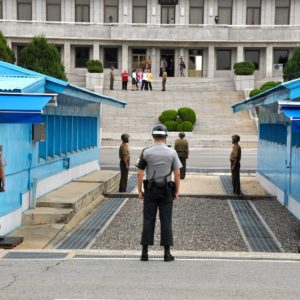WASHINGTON — You have to wonder where Kim Jong-un is going with his current “peace offensive” directed at South Korea. The euphoria over his decision to authorize North-South talks and maybe send a team to the Winter Olympics is intoxicating. President Moon Jae-in, his ministers and aides are jumping with joy, as indeed are a lot of people in the United States who see, finally, the possibility of yet another inter-Korean agreement and a peaceful end to recriminations and threats.
If history is any guide, however, the drunken mood of exhilaration is likely to end in a severe hangover as have so many understandings in the past. North Korea wants to attain major goals from this gesture. Obviously, a break in the U.S.-South Korean alliance is one of them. In Washington, that’s perhaps the primary concern as strategists in the White House, the Pentagon and the State Department try to anticipate North Korean demands and still cooperate with President Moon.
President Trump, despite all the criticism that he’s aroused, seems to have come up with the right answers. He has not only applauded the possibility of a breakthrough but gone along totally with Moon’s call for postponing annual U.S.-South Korean military exercises. Moreover, he has said that he personally would be willing to meet Kim Jong-un. That remark echoes his comment during his presidential campaign, more than a year ago, in which he said he’d enjoy having “a hamburger” with him.
By making these remarks Trump is doing two things.
First, as he loves to do, he personally is taking credit for having drawn Kim Jong-un into a conciliatory position. Trump is claiming that his rhetoric, in which he has warned of the “fire and fury” that he could inflict on North Korea and said he is ready to press a “button” bigger than the one that Kim has on his desk for firing a nuclear warhead, is having a serious positive effect.
Second, Trump is betting that Kim’s regime, hit by increasingly strong sanctions, is indeed in need of relief from suffering, and he is hinting that he as president would like to be merciful. Rather than order a “pre-emptive strike” on his missile and nuclear facilities, Trump is responding with a message of peace that is quite startling when contrasted with his previous remarks.
But what’s really going on? Let’s say the Olympics fulfill all the dreams of wishful thinkers in Seoul and Washington and go off without a hitch. The spectacle of North Korean athletes at the Games would be a huge propaganda coup, as much for Moon Jae-in as for Kim Jong-un. And then what?
One thing is for sure. Kim is not going to give up his nuclear program. He is not going to stop missile tests. And he is going to be extremely angry when the United States and South Korea follow through on their stated plan and stage the exercises in March that they put off for the duration of the Winter Olympics and then the Paralympics. The United States, if Kim’s bluster seems still more threatening than usual, may consider a blockade around North Korean ports to make certain no sanctioned goods enter or leave the North. The Korean crisis could grow worse, rather than better, in the aftermath of the Olympics.
Will President Moon, under such circumstances, still support the U.S. alliance after the Olympic Games? Yes, he has often demanded North Korea give up its nuclear program, and he has called for strengthening South Korean forces. The concern here is that North Korea may have weakened Moon’s will to stand up against the North while leftist advisers surrounding him try to talk him into persuading the Americans of the need to scale down if not cancel military exercises.
That’s where we get into the issue of freeze-for-freeze. North Korea’s old-time Korean War allies, China and Russia, have both called for a deal under which North Korea agrees not to engage in nuclear and missile tests if the United States and South Korea give up the war games, which commanders agree are essential for training and readiness.
What better time to press for freeze-for-freeze than during the Games? Never mind that North Korea, under freeze-for-freeze, would not give up its nukes and missiles and would not stop its own military exercises. Kim Jong-un and his negotiators and emissaries at the Games may be expected to intensify pressure on Moon to fall for this ruse.
Will President Moon yield to such importunate demands? He faces a test of will that should determine the future of the long standoff with North Korea.
In Washington, no one is certain exactly how Moon will respond but can only pray that Kim Jong-un will fail in his transparent attempt to win him over. The fear is he may sacrifice the best interests of the South for the sake of another phony peace deal that North Korea will then violate and try to exploit, as it has done so often before.

